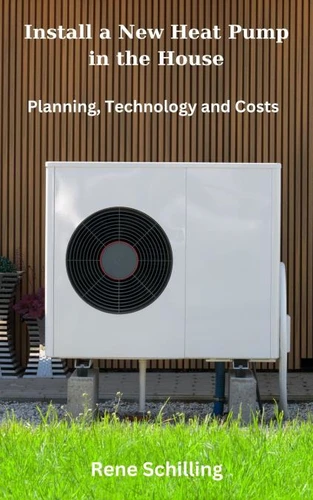Install a New Heat Pump in the House, Planning, Technology and Costs
Par :Formats :
Disponible dans votre compte client Decitre ou Furet du Nord dès validation de votre commande. Le format ePub est :
- Compatible avec une lecture sur My Vivlio (smartphone, tablette, ordinateur)
- Compatible avec une lecture sur liseuses Vivlio
- Pour les liseuses autres que Vivlio, vous devez utiliser le logiciel Adobe Digital Edition. Non compatible avec la lecture sur les liseuses Kindle, Remarkable et Sony
 , qui est-ce ?
, qui est-ce ?Notre partenaire de plateforme de lecture numérique où vous retrouverez l'ensemble de vos ebooks gratuitement
Pour en savoir plus sur nos ebooks, consultez notre aide en ligne ici
- FormatePub
- ISBN8223056577
- EAN9798223056577
- Date de parution25/12/2023
- Protection num.pas de protection
- Infos supplémentairesepub
- ÉditeurDraft2Digital
Résumé
Introducing heat pumps into the home is an important step towards a sustainable and efficient energy supply. A heat pump is a device that takes energy from the surrounding air, ground or groundwater and converts it into usable heat for heating and hot water. Compared to conventional heating systems based on fossil fuels, heat pumps are more environmentally friendly and energy efficient. One of the main advantages of heat pumps is their energy efficiency.
Unlike conventional heating systems, which burn energy from fossil fuels such as oil or gas, heat pumps work with electrical energy. This means that for every kilowatt hour of electricity consumed by a heat pump, three to four kilowatt hours of usable heat can be generated.
Unlike conventional heating systems, which burn energy from fossil fuels such as oil or gas, heat pumps work with electrical energy. This means that for every kilowatt hour of electricity consumed by a heat pump, three to four kilowatt hours of usable heat can be generated.
Introducing heat pumps into the home is an important step towards a sustainable and efficient energy supply. A heat pump is a device that takes energy from the surrounding air, ground or groundwater and converts it into usable heat for heating and hot water. Compared to conventional heating systems based on fossil fuels, heat pumps are more environmentally friendly and energy efficient. One of the main advantages of heat pumps is their energy efficiency.
Unlike conventional heating systems, which burn energy from fossil fuels such as oil or gas, heat pumps work with electrical energy. This means that for every kilowatt hour of electricity consumed by a heat pump, three to four kilowatt hours of usable heat can be generated.
Unlike conventional heating systems, which burn energy from fossil fuels such as oil or gas, heat pumps work with electrical energy. This means that for every kilowatt hour of electricity consumed by a heat pump, three to four kilowatt hours of usable heat can be generated.










